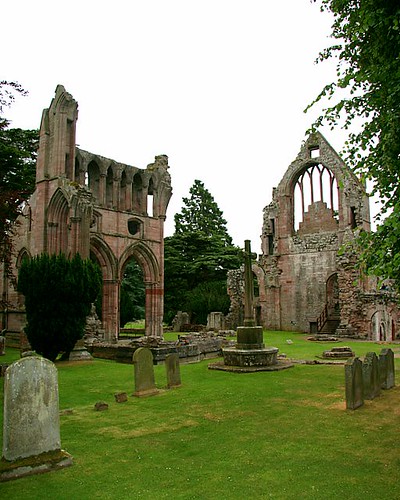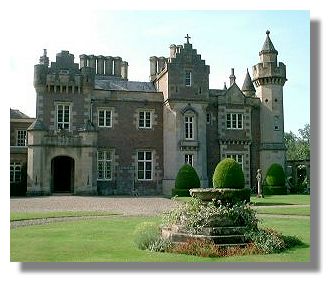 Sir Walter Scott of Abbotsford came from the race of Scotts of Harden, one of many war-like families on the Borders of Scotland in the Middle Ages who made raids across the border with England.
Sir Walter Scott of Abbotsford came from the race of Scotts of Harden, one of many war-like families on the Borders of Scotland in the Middle Ages who made raids across the border with England.He is collaterally related to the Montagu-Douglas-Scott, Dukes of Buccleuch, the Chief of Clan Scott. This, together with a time he spent with his grandfather at his home near Dryburgh Abbey, gave Scott his great interest in the ages of faith and the ancient history of Scotland.
He fairly lived and dreamed the romance of chivalry and the ages of faith, whilst all the time remaining a member of the Episcopal Church of Scotland. In the age he lived in, he could not contemplate the great sacrifice necessary for a Scotsman of his class and background to become a Catholic, even assuming that he really wanted to.
Nevertheless, although he tries to conceal it with the usual Georgian and Victorian prejudices against the Catholic Church, there is a constant, latent hint of sympathy and sneaking admiration for the towering strength and majesty of the Catholic Church and the fierce loyalty and courage it inspires in the best of its members. Once can feel Scott secretly admiring this. There is even a palpable but hidden yearning for it throughout all his novels and poems, albeit well-concealed.
Scott became a lawyer, a member of the Scottish Faculty of Advocates, and later Sheriff-Depute (a Judge) of Selkirk, and eventually, with the income from his writing, he was able to build Abbotsford, his Scottish baronial style home in the Borders, which stands to this day. His fame resulted in his being raised to the baronetcy by the King.
Scott had married, in December 1797, Mlle Margaret Charlotte Charpentier, a French royalist emigre whose family had escaped from the French revolutionary terror, one of those many, often aristocratic, French exiles who did so much to re-align British views of French Catholicism. She must surely have had some influence on Scott's views of the Catholic religion.
However, Scott later fell into enormous debt when the legal firm of which he had remained a sleeping partner became insolvent and he was made liable for its debts. He escaped bankruptcy by putting Abbotsford into trust with his creditors as beneficiaries and then proceeded to write his way out of debt which, astonishingly, he eventually succeeded in doing, albeit the last remaining debts were only finally cleared shortly after his death from his estate, the ever-increasing wealth of which was due to the continuing huge success of his writings.
Here is one of his many poems with a Catholic flavour:
The Bare-footed Friar
I’ll give thee, good fellow, a twelvemonth or twain,
To search Europe through, from Byzantium to Spain;
But ne’er shall you find, should you search till you tire,
So happy a man as the Barefooted Friar.
Your knight for his lady pricks forth in career,
And is brought home at even-song prick’d through with a spear;
I confess him in haste—for his lady desires
No comfort on earth save the Barefooted Friar’s.
Your monarch? —Pshaw! many a prince has been known
To barter his robes for our cowl and our gown,
But which of us e’er felt the idle desire
To exchange for a crown the grey hood of a Friar!
The Friar has walk’d out, and where’er he has gone,
The land and its fatness is mark’d for his own;
He can roam where he lists, he can stop when he tires,
For every man’s house is the Barefooted Friar’s.
He’s expected at noon, and no wight till he comes
May profane the great chair, or the porridge of plums
For the best of the cheer, and the seat by the fire,
Is the undenied right of the Barefooted Friar.
He’s expected at night, and the pasty’s made hot,
They broach the brown ale, and they fill the black pot,
And the goodwife would wish the goodman in the mire,
Ere he lack’d a soft pillow, the Barefooted Friar.
Long flourish the sandal, the cord, and the cope,
The dread of the devil and trust of the Pope;
For to gather life’s roses, unscathed by the briar,
Is granted alone to the Barefooted Friar.
It is typical Scott: he tilts, in good Protestant fashion, at the allegedly easy life of a mendicant friar, giving no credit whatever for the self-mortifications, strong discipline and nightly rising for prayer, which was then a part of the life of every good friar, but at the same time you sense that he knows he is both celebrating and short-changing the friar.
Scott completely revolutionised the attitude of the English and Lowland Scots to the Celtic Highland clans and even to the Middle Ages and, thus, indirectly to the Catholic Church. Of course Victorian Protestants still maintained their false claims against the Catholic Church but with greater softening of former rigour which must, in its way, have contributed to Catholic emancipation in these islands.
...

















.jpg)


























_-002.jpg/220px-Circle_of_Anton_Raphael_Mengs,_Henry_Benedict_Maria_Clement_Stuart,_Cardinal_York_(ca_1750)_-002.jpg)



1 comment:
Thank you so much for this post! I just read Ivanhoe and was upset about the ignorance of Catholic teaching in it. This post really helped put it in context!
Post a Comment